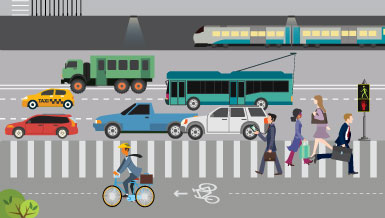Day 263 - tired of RTO
Today is the 4th day of the 38th week, the 20th day of the 9th month, the 263rd day of 2023 [with 95 shopping days left until Christmas], and:
- International Day of University Sport
- National Care for Kids Day
- National Fried Rice Day
- National Gibberish Day
- National LGBTQ Veterans Day
- National Pepperoni Pizza Day
- National Punch Day
- National School Backpack Awareness Day
- National String Cheese Day
- and Voyager 1 is 22h 21m 16s of light travel time from Earth
Quote of the day:
“As Harvard University psychologist Daniel Gilbert argues, 'You can't adapt to commuting, because it's entirely unpredictable. Driving in traffic is a different kind of hell every day.'”
― Tom Vanderbilt, Traffic: Why We Drive the Way We Do and What It Says About Us
Today as I was noodling about the webs, I found [and shared across different social media platforms] a story about how surprising it is that boomers are the largest segment of workers unwilling to return to the office. Why should anyone be surprised?
For years, we have set our alarms, dressed for success, climbed into our cars, driven for miles [or to a bus stop or subway or train station] - taking anywhere from 30 to 90 minutes to get to our work each day. After working at least eight hours [ten+ if you are in management or working your way up in a career], we climb back into our cars [or get on the bus, subway, or train], and head home, a trip guaranteed to take 30 minutes to two hours or more. And we have done that every work day for 50 weeks [assuming you get at least a two week vacation]. The average commute in America is about 27 minutes, but in metro areas that is almost doubled to approximately 43 minutes each way. So let's call it 90 minutes a day average, and that means we spent 187.5 hours on the road EACH YEAR. Or, in other words, 2.14% of our total available time each year is devoted just to the unpaid labor involved in getting to work. At an average salary [in Maryland] of $61,397 [an hourly rate of about $29.52], we have spent $5,535 just for the travel time, and that doesn't count the expenses incurred by driving a car or riding mass transit. Nor does it take into account the physical and emotional wear and tear on the individual.
For most of my work career, the technology did not exist for remote work. Fitting out a home office could be done, but that was often a pricy undertaking. However, many of us realized as office tech improved that the jobs we were doing could be accomplished remotely - but it took a major pandemic to prove the point. Suddenly we all got back at least 1 1/2 hours a day, every day while saving a lot of money and aggravation at the same time. Even returning on a hybrid schedule is only barely palatable because as I get older, my time becomes far more valuable to me. You want workers to return to the office so you can take attendance? Expect to start paying for the commute.
At least that is this particular boomer's opinion - and I'm betting a lot of folks who are older would agree with my reasoning. Engagement, mentoring, productivity - all of these things can be done quite effectively remotely - it takes some effort on a manager's part [and yes, I am a manager] and it is a different skill set, but it can be done.
Now, can we talk about the four-day work week?




Comments
Post a Comment